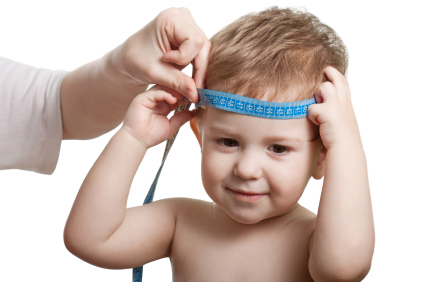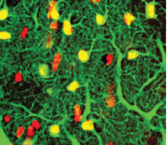Arbaclofen May Improve Social Behavior in Fragile X Syndrome and Irritability in Autism
 Fragile X syndrome is a genetic condition that is the most common single-gene cause of autism and inherited cause of intellectual disability. In addition to mental disabilities it is also characterized by certain physical characteristics (elongated face, protruding ears, and large testes in boys), stereotypic movements such as hand-flapping, and social anxiety.
Fragile X syndrome is a genetic condition that is the most common single-gene cause of autism and inherited cause of intellectual disability. In addition to mental disabilities it is also characterized by certain physical characteristics (elongated face, protruding ears, and large testes in boys), stereotypic movements such as hand-flapping, and social anxiety.
When autism is associated with Fragile X, a mutation in the Fragile X gene is responsible for the autism. (It is also possible to have autism without Fragile X, or to have Fragile X without autism.) Fragile X is a genetic disorder like Downs Syndrome, while autism is a complex behavioral disorder, likely involving multiple genetic and environmental vulnerabilities.
A new drug called arbaclofen seems to improve social avoidance and problem behaviors in adults and children with Fragile X. Researchers hypothesize that normal social stimuli overwhelm a Fragile X patient because of a defect in inhibition, and arbaclofen acting on presynaptic GABA-B receptors reduces glutamate release, thereby reducing the overactive signaling associated with this defect.
In a 6-week placebo-controlled study of arbaclofen among 63 patients with Fragile X ranging in age from 6 to 39, patients 11 years old and younger received 10mg twice a day and patients 12 and up received 10mg three times a day. The drug was well-tolerated, with only a few reports of sedation or headache. While problem social behaviors and neurobehavioral function improved, irritability did not. The study considered irritability because that is the aspect of autism most often improved by other Federal Drug Administration-approved drugs for autism, such as risperidone and aripiprazole. In another study of arbaclofen in autism spectrum disorders, it did improve irritability and agitation.
Editor’s Note: The GABA-B agonist arbaclofen has previously shown positive effects in motor spasticity. The positive effects noted here in the social domain of autism spectrum disorders and Fragile X are very promising.
Reminder: Multiple Risks for Fetus in Mothers Treated with Valproate
In pregnant women, exposure of the fetus to the anticonvulsant valproate (VPA or Depakote) is associated with a variety of serious problems that include congenital malformations, developmental delay, and autism.
The major congenital malformations that can result from valproate exposure include spina bifida, which results in lifelong paralysis of the child’s lower limbs.
Developmental delay resulting from valproate exposure can cause an average loss of 9 IQ points compared to children exposed to other anticonvulsant drugs in utero. The effects appear to be in part dose-related and dependent on the intensity of combination treatment with other agents. These deficits were originally seen in children at 3 years of age and were shown to persist in six-year-olds according to an article by Meador et al. this year in Lancet Neurology.
Now in addition, fetal exposure to valproate has been liked to autism and related disorders in an 11-year longitudinal study published this year in the Journal of Neurology, Neurosurgery and Psychiatry. A diagnosis of a developmental disorder occurred in 17% of children whose mothers were on valproate as opposed to 2% whose mothers were on carbamazepine and 7% whose mothers were on lamotrigine.
Neurologists are increasingly recommending that all women of childbearing age who are on a treatment regimen including valproate be treated with folic acid and vitamins B6 and B12, in the hopes that these might mitigate valproate’s effects on the fetus in the case of an unplanned pregnancy. The effectiveness of these vitamins has not been directly demonstrated. However, the study by Meador et al. did show that children of mothers who took prenatal folic acid supplements had IQs on average 7 point higher than children whose mothers did not. The benefit was seen only when mothers were already taking folic acid when they became pregnant and was not observed in children of mothers who began taking it after the first trimester.
Women of childbearing age should avoid valproate and if this is not possible, they should carefully protect themselves against an unwanted pregnancy. Women with bipolar disorder are 3.9 times more likely to have unplanned pregnancies than women of similar age in the general population. These data suggest the importance of careful education about birth control in patients with bipolar illness so that pregnancies can be planned for periods of good health and so that appropriate pharmacological measures can be taken.
Memantine May Be Useful in OCD, ADHD, and Autism
Memantine (Namenda) is an N-methyl-D-aspartate (NMDA) glutamate receptor antagonist that is FDA-approved for the treatment of Alzheimer’s dementia. Its use in other illnesses such as bipolar disorder and autism is currently being explored.
As we have written in previous issues of the BNN, A. Anand et al. reported in 2012 that in bipolar depression, memantine has an initial antidepressant augmentation effect when added to lamotrigine, an inhibitor of glutamate release. Koukopoulos et al. also reported in 2012 that in an open study, memantine had a large and sustained effect in previously treatment-resistant patients with bipolar disorder, producing an impressive 60-70% rate of excellent response at 6 months and again at 12 months of follow-up.
There is some evidence that memantine can be useful in obsessive-compulsive disorder (OCD). In a randomized double-blind placebo-controlled study of memantine combined with fluoxetine published by Ghaleiha et al. in 2012, patients with moderate to severe OCD taking memantine and fluoxetine were more likely to achieve remission after 8 weeks than patients taking placebo and fluoxetine.
Attention-deficit/hyperactivity disorder (ADHD) is another condition that memantine may be able to treat. Disturbances in NMDA receptor activity are thought to play a role in ADHD. Small, preliminary studies of memantine in ADHD have been promising.
New research has begun to explore memantine’s effects in autism. In one recent randomized, double-blind, placebo-controlled study published by Ghaleiha et al. in the International Journal of Neuropsychopharmacology, memantine produced improvement in children with autistic disorder when the drug was added to a treatment regimen that included risperidone, which blocks dopamine D2 receptors and is FDA-approved for the treatment of schizophrenia and mania, as well as autism.
However, at the 2012 meeting of the American Academy of Child and Adolescent Psychiatry, Robert Findling presented a poster on extended release memantine (Namenda) in children with autism, a study with negative results. This was a monotherapy study, unlike the above studies in which memantine was added to treatment with another drug. Findling found that extended release memantine (at doses of 3mg to 15mg per day) was well tolerated in children with autism, but the drug on its own was not significantly more effective than placebo in these preliminary studies.
Editor’s Note: Taken together, these data suggest an emerging role for memantine and possibly other drugs that work through NMDA receptor blockade in several disorders associated with repetitive behavior, like OCD and autism. The role of memantine augmentation in each of these syndromes deserves further exploration.
Folic Acid During Pregnancy May Lower Autism Risk
 A study of 85,000 children in Norway that was recently published in the Journal of the American Medical Association showed that women who took folic acid during pregnancy were 40% less likely to have a child who developed autism.
A study of 85,000 children in Norway that was recently published in the Journal of the American Medical Association showed that women who took folic acid during pregnancy were 40% less likely to have a child who developed autism.
A summary of the research by National Public Radio explained:
Folic acid is the synthetic version of a B vitamin called folate. It’s found naturally in foods such as spinach, black-eyed peas and rice. Public health officials recommend that women who may become pregnant take at least 400 micrograms of folic acid every day to reduce the chance of having a child with spina bifida.
The folic acid’s effect reduced the most severe cases of autism but did not seem to have an effect on the incidence of more mild forms, such as Asperger syndrome. The benefits were seen in those women who had been taking folic acid for 4 weeks before conception and continued to take the supplement during the first 8 weeks of pregnancy.
N-acetylcysteine Improved the Irritability Associated with Autism
 At the 57th Annual Meeting of the American Academy of Child and Adolescent Psychiatry (AACAP) in October 2010, Lawrence Fung of Stanford University reported that N-acetylcysteine (NAC), a compound sold over-the-counter in health food stores, improved irritability and other symptoms of autism in children aged 8 to 17. In this double-blind, randomized study of NAC compared with placebo, the children who received NAC were treated with 900mg once a day for four weeks, then 900mg BID (twice a day) for four weeks, and finally 900mg TID (three times a day) for the last four weeks of this three-month study. These doses significantly improved irritability and stereotypy (repetitive behaviors) compared with placebo. Side effects were minimal.
At the 57th Annual Meeting of the American Academy of Child and Adolescent Psychiatry (AACAP) in October 2010, Lawrence Fung of Stanford University reported that N-acetylcysteine (NAC), a compound sold over-the-counter in health food stores, improved irritability and other symptoms of autism in children aged 8 to 17. In this double-blind, randomized study of NAC compared with placebo, the children who received NAC were treated with 900mg once a day for four weeks, then 900mg BID (twice a day) for four weeks, and finally 900mg TID (three times a day) for the last four weeks of this three-month study. These doses significantly improved irritability and stereotypy (repetitive behaviors) compared with placebo. Side effects were minimal.
Editor’s note: The potential for a safe compound such as N-acetylcysteine to show efficacy in autism is striking. Currently only risperidone and aripiprazole are FDA-approved for effectiveness treating irritability in autism. There has also been a positive study of valproate compared with placebo in autism, although it is not FDA-approved for this purpose.
Most double-blind, placebo controlled clinical trials of NAC have been in adults, so this is the first report that suggests NAC can safely be used in children.
NAC’s ability to improve irritability in autism raises the possibility that this drug may be useful in the treatment of irritability and repetitive behaviors in bipolar disorder, particularly since N-acetylcysteine has also been reported to improve mood, especially depression, in adults with bipolar disorder in the studies of Mike Berk and colleagues published in Biological Psychiatry in 2008.
This study adds to the evidence that suggests N-acetylcysteine may reset the brain’s habit system in the ventral striatum (also called the nucleus accumbens), which is involved in the assessment of the reward value of a variety of substances of abuse and behaviors (as described in BNN Volume 14, Issue 1 from 2010). NAC improves a number of habit-related syndromes including cocaine, heroin, and gambling addictions, trichotillomania (compulsive hair-pulling), and now the irritability and stereotypic behaviors of autism.
In light of NAC’s profile of efficacy and safety, systematic exploration of the drug in childhood-onset bipolar illness is indicated. We are aware of at least one group that is planning such a study.
Stress or Ultrasonic Stimulation In Utero Could Alter Neuronal Migration Patterns
At the 57th Annual Meeting of the American Academy of Child and Adolescent Psychiatry (AACAP) in October 2010, Hanna Stevens of the Yale Child Study Center reported that rat pups in utero who experienced prenatal stress (i.e., when the pregnant rat was restrained during the last week of pregnancy) had fewer neurons containing GABA, which is the main inhibitory neurotransmitter in the brain, than control pups. This deficit may reflect a delay in the neurons’ ventral to rostral migration or in their maturation. These deficits in GABAergic neurons following prenatal stress are noteworthy in light of the deficits in GABAergic neurons found in adults with bipolar illness. This research is unusual in that it suggests that prenatal stress can affect neuronal numbers.
Editor’s Note: Stevens was aware of data from the renowned neuroanatomist Pasco Rakic, also at Yale. Some years ago Rakic reported that ultrasonic stimulation of the brain had major disorganizing effects on neuronal migration in the primate brain. Since prenatal stress and ultrasonic stimulation can affect neuronal migration, and dysregulation of neuronal migration has been implicated in autism, these data raise the hypothesis (so far untested) that one possible reason for the recent increases in the incidence of autism is the increased use of sonograms to monitor various aspects of prenatal growth and development during pregnancy. These preclinical findings deserve to be further studied for their potential relevance to humans.
Thalamic Volume and Neural Connectivity in Autism
 Ish Bhalla reported at the 57th Annual Meeting of the American Academy of Child and Adolescent Psychiatry (AACAP) in October 2010 that children with autism have greater thalamic volume than normal controls. Other posters presented at the meeting showed that patients with autism spectrum disorders have connectivity abnormalities, with increased connectivity of neurons to other nearby neuronal groups and decreased connectivity of neurons to areas of the brain at a greater distance.
Ish Bhalla reported at the 57th Annual Meeting of the American Academy of Child and Adolescent Psychiatry (AACAP) in October 2010 that children with autism have greater thalamic volume than normal controls. Other posters presented at the meeting showed that patients with autism spectrum disorders have connectivity abnormalities, with increased connectivity of neurons to other nearby neuronal groups and decreased connectivity of neurons to areas of the brain at a greater distance.
Editor’s Note: These findings echo reports that the corpus callosum, the main structure connecting neurons across the two hemispheres of the brain, is smaller in autism. In addition, other investigators have reported abnormalities in cortical column structure in autism.
Interestingly, the findings of increased volume and altered connectivity may even be reflected in measurements of brain and head size. A substantial literature supports the observations that children with autism have greater initial head size and growth of their heads compared with the normal infant population.
Oxytocin, the Social Affiliation Drug, Has Interesting Effects in Autism and Now Schizophrenia
 In 2007, investigator E. Hollander from Mt. Sinai published data indicating that intranasal oxytocin was associated with increases in target behaviors in patients with autism.
In 2007, investigator E. Hollander from Mt. Sinai published data indicating that intranasal oxytocin was associated with increases in target behaviors in patients with autism.
Now a study by David Feifel of the University of California, San Diego presented at the 65th Annual Scientific Convention of the Society of Biological Psychiatry showed that patients with schizophrenia showed improvement in symptomatology and increases in the recognition of positive facial affect after oxytocin was added to their antipsychotics regimen. Morris Goldman of Northwestern University reported that patients with schizophrenia, who often make mistakes assessing fear on facial emotion recognition tests, described fewer faces as fearful after receiving intranasal oxytocin.
Editors note: These new findings are built on the pioneering preclinical work of Tom Insel. He found marked differences in oxytocin and its receptors in the brains of mountain voles (who are largely asocial) compared to prairie voles (who are highly social and form lifelong bonds with their mates). Although these oxytocin findings have not yet produced a treatment for any psychiatric syndrome, they illustrate the potential of general scientific findings to inform new approaches to human illnesses.
Aripiprazole (Abilify), the Atypical Atypical Antipsychotic
This is an overview of the drug aripiprazole.
Spectrum of Efficacy
Aripiprazole has now been approved for acute and maintenance treatment of pediatric patients with bipolar disorder from ages 10 to 17. It had already been approved for adult bipolar disorder, schizophrenia, and as an adjunctive treatment for acute unipolar depression inadequately responsive to antidepressants of the serotonin-selective class or the serotonin-norepinephrine reuptake inhibitor venlafaxine. Aripiprazole, along with risperidone, is one of only two drugs FDA-approved for the treatment of irritability in autism.
Read more
Aripiprazole (Abilify) Now FDA-Approved to Decrease Irritability in Children with Autism
In a recent study, children 6-12 years old with autism were treated with aripiprazole and showed improvement in irritability. The study lasted 52 weeks and had an open-label flexible-dose design (ranging from 2-15 mg/day) with an average dose of 9.6 mg/day. Few discontinuations occurred due to adverse effects, suggesting that aripiprazole is generally safe for use in this patient cohort. Increase in weight gain was the reason seven subjects (2%) discontinued the drug, although weight gain appeared to plateau with continued treatment.
Aripiprazole is already FDA-approved for the treatment and prevention of mania in adults and children (10-17 years). It is also approved as an adjunct (add-on) to poorly effective antidepressants in adults with unipolar (non-psychotic) major depression.
EDITOR’S NOTE: The general safety and tolerability of aripiprazole for the treatment of irritability in children with autistic disorder in this study means the drug can be added to the list of potential treatments for patients with autism. Previously, only risperidone had shown strong placebo-controlled data for efficacy in autism. A study by Hollander published in Neuropsychopharmacology this year indicated that valproate was also significantly better than placebo in treating irritability in children with autism spectrum disorders.




